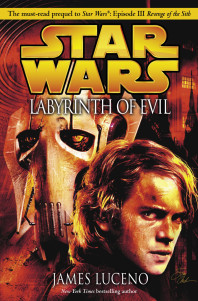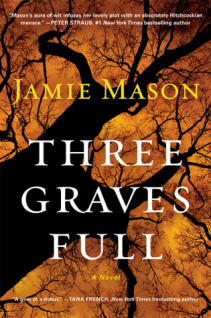
Broody Anakin is broody.
I have embarked on a quest to read through the Star Wars Expanded Universe once more. Be sure to check the linked text there to see other posts in this series. Here, we look at Labyrinth of Evil , the beginning of The Dark Lord Trilogy, which tells the story of the rise of Darth Vader. There will be SPOILERS in what follows. Please do not SPOIL later books in the comments.
Labyrinth of Evil
Labyrinth of Evil came to me highly recommended as part of another trilogy which, like the Darth Bane trilogy, showed the dark side of the Force in an interesting way. I had been looking forward to reading it for a while and finally picked up the book from the library.
One thing I’ll immediately say in its favor is that it presents a broader picture of how Anakin Skywalker went from a hero to a Sith Lord. There are more gaps filled in about how his reasoning behind several decisions made sense at the time, as well as his growing frustration with his position within the Jedi. It makes Episode III seem more plausible in the fall of Vader. I also quite enjoyed the development of Count Dooku, who I believe could have been a much bigger deal in the movies than he was. Plus, he has the coolest lightsaber, so there’s that. Anyway, the book makes him seem more of an interesting character than a man who was just easily duped by the Emperor.
There are a number of problems with the book, however. For one, Obi-Wan Kenobi is portrayed as very whiny. Rather than guiding Anakin, it seems he’s always just complaining about things he does–many times without merit. Perhaps this is a stylistic way to show Anakin’s perspective on how Obi-Wan is obnoxious, but it struck me as pretty out of character. Of course, Kenobi is also portrayed in a similar fashion in the Clone Wars TV show, which is apparently canon, so maybe it’s just my feelings about what Kenobi should be played like that I’m going by. Still, it annoyed me. The dialogue is part of the problem, and that persists throughout the book for all the characters. Conversations seem stilted and forced. Another problem is that the galaxy is made, again, to be too small. When there are so many people and droids in the universe, how is it that the same 10 people keep making everything happen? It seems to stretch credulity and make Star Wars seem much smaller than it should.
Labyrinth of Evil shows Anakin as a selfish, increasingly insular individual and makes the fall he experiences in Episode III feel more plausible than it does with just the film. However, it suffers from some of the same difficulties the entire prequel trilogy suffered from. It’s a decent read, but not a fantastic one.
The Good
+Provides background for the fall of Anakin Skywalker
+Some good development of Count Dooku
The Bad
-Obi-Wan Kenobi is incredibly obnoxious, which seems pretty out of character
-The dialogue is not great
-Many key points seem rushed
-Again makes the galaxy seem tiny
Best Droid Moment
When Anakin decides that he could have done whatever he wanted because he thinks of C-3PO and his construction of that protocol droid. Kind of a strange aside but it shows Anakin’s arrogance.
Grade: C+ “It sets the table to understand more of the fall of Anakin Skywalker, though it doesn’t do so in a particularly compelling or unexpected way.”
J.W. Wartick- Always Have a Reason– Check out my “main site” which talks about philosophy of religion, theology, and Christian apologetics (among other random topics). I love science fiction so that comes up integrated with theology fairly frequently as well. I’d love to have you follow there, too!
Reading through Star Wars: Expanded Universe– Here you can read other posts in this series (reviews of other EU books) and make suggestions about what I should include in my reviews.
Be sure to follow me on Twitter for discussion of posts, links to other pages of interest, random talk about theology/philosophy/apologetics/movies/scifi/sports and more!
There are other posts on science fiction books to be found! Read them here.
SDG.
Advertisements Share this:




